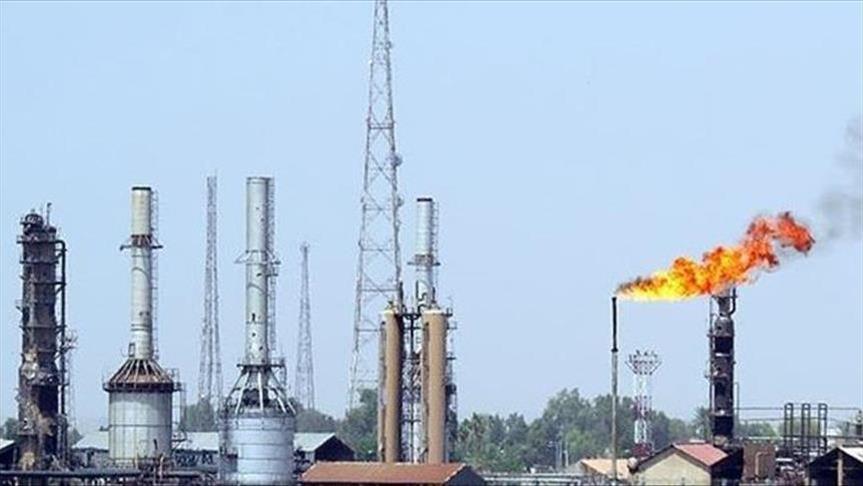In recent times, the global energy landscape has witnessed a significant development that has sent ripples of excitement through the industry. This buzz surrounds the claims made by none other than the former President of the United States, Donald Trump, about the discovery of massive oil reserves in Pakistan. This revelation has sparked intense interest among US firms, which are now eager to explore Pakistan's oil sector. According to Trump's claims, the US has discovered massive oil reserves in Pakistan, which could potentially alter the country's economic trajectory. This news has generated immense interest globally, particularly among oil-producing nations and companies involved in the energy sector. The implications of such a discovery are far-reaching, and Pakistan, in particular, stands to gain significantly from this development. The interest shown by US firms in exploring Pakistan's oil sector is a testament to the country's untapped potential in the energy domain. Pakistan has long been known to possess significant oil and gas reserves, but the lack of investment and exploration has hindered the country's ability to fully capitalize on these resources. With US firms now showing interest, Pakistan may finally be able to unlock its true potential in the oil sector. Some of the key highlights of this development include:
- Massive oil reserves: The discovery of massive oil reserves in Pakistan is a game-changer for the country's economy. With the global demand for energy on the rise, Pakistan's oil reserves could play a critical role in meeting this demand.
- US firms' interest: The interest shown by US firms in exploring Pakistan's oil sector is a significant development. This could lead to increased investment, technology transfer, and job creation in Pakistan.
- Economic growth: The exploration and production of oil in Pakistan could lead to significant economic growth, reducing the country's reliance on imported fuels and enhancing its energy security.
- Regional implications: The discovery of oil reserves in Pakistan could have far-reaching implications for the region, potentially altering the balance of power in the energy sector.

Trump's Claims and Their Impact
- Trump's claim of massive oil reserves in Pakistan was unsubstantiated and lacking in scientific basis.
- The Pakistani government's reaction was one of caution and skepticism, aimed at managing public expectations.
- The claim had a brief but significant impact on the Pakistani economy, particularly the value of the rupee.
- The long-term consequences of the claim include a lack of investment and development in the energy sector, perpetuating Pakistan's reliance on imports.

US Firms' Interest in Pakistan's Oil Sector
- ExxonMobil: The multinational oil and gas corporation has been actively exploring opportunities in Pakistan, with a focus on offshore drilling.
- Chevron: The California-based energy giant has been operating in Pakistan since the 1990s and has expressed interest in expanding its operations in the country.
- ConocoPhillips: The US-based energy company has been eyeing Pakistan's oil sector, with a focus on exploring new oil and gas reserves.
- Hess Corporation: The New York-based energy company has been actively exploring opportunities in Pakistan, with a focus on offshore drilling.

Challenges and Opportunities in Pakistan's Oil Sector
- Dependence on imported oil: Pakistan's oil sector is heavily reliant on imported oil, which puts a significant burden on the country's foreign exchange reserves.
- Low exploration and production: The country's oil exploration and production activities are limited, resulting in a slow pace of discovery of new oil reserves.
- Inefficient pricing mechanism: The pricing mechanism for petroleum products in Pakistan is inefficient, leading to frequent price hikes and shortages.
- Lack of investment: The oil sector in Pakistan lacks investment, both from local and foreign investors, which hinders its growth and development.
- Exploration and production: The government has identified several blocks for oil and gas exploration, offering opportunities for foreign investors to participate in the sector.
- Refining and petrochemicals: The country needs to increase its refining capacity, providing opportunities for investment in new refineries and petrochemical plants.
- Infrastructure development: The development of transportation infrastructure, including pipelines and storage facilities, offers opportunities for investment in the sector.

Implications for Regional Energy Dynamics
- Enhanced Pakistan-US Ties: The involvement of US firms in Pakistan's oil sector is likely to strengthen bilateral ties between the two countries. This could lead to increased cooperation in other areas, such as counter-terrorism and trade.
- China's Concerns: China, which has significant investments in Pakistan's energy sector, may view the entry of US firms as a challenge to its influence in the region. This could lead to increased competition between the two global powers in Pakistan.
- Iran's Reactions: Iran, which shares a border with Pakistan, may be concerned about the potential impact of increased oil production in Pakistan on its own energy exports. This could lead to increased diplomatic efforts by Iran to maintain its energy market share in the region.
- Increased Energy Competition: The entry of new players in Pakistan's oil sector will increase competition for energy resources, leading to potential price wars and changes in the regional energy market.
- Cooperation and Joint Ventures: The involvement of US firms may also lead to cooperation and joint ventures between Pakistan, the US, and other regional players, such as China and Iran. This could result in the development of new energy infrastructure and increased energy trade in the region.
- Regional Energy Security: The increased production of oil in Pakistan is likely to enhance regional energy security, reducing reliance on imported fuel and enhancing energy self-sufficiency.

Frequently Asked Questions (FAQ)
What is the current state of Pakistan's oil sector?
Pakistan's oil sector has been a vital component of the country's economy, playing a crucial role in meeting the energy demands of its growing population. Despite being a net importer of oil, Pakistan has made significant strides in developing its oil infrastructure and increasing domestic production. Current Production Levels Currently, Pakistan's daily oil production stands at around 90,000 barrels per day (bpd). This is a significant increase from the 2015 levels, which stood at around 70,000 bpd. The country's oil production is primarily driven by the state-owned Pakistan Petroleum Limited (PPL) and the Oil and Gas Development Company Limited (OGDCL), which account for over 70% of the total production. The remaining 30% is contributed by private sector companies, including Pakistan Oilfields Limited (POL) and Mari Petroleum Company Limited (MPCL). Infrastructure Pakistan's oil infrastructure is comprised of a network of refineries, pipelines, and storage facilities. The country has a total refining capacity of around 450,000 bpd, with five refineries operating in the country. These refineries are:
- Parco Mid-Country Refinery, located in Punjab, with a capacity of 120,000 bpd
- Attock Refinery Limited, located in Punjab, with a capacity of 54,000 bpd
- National Refinery Limited, located in Karachi, with a capacity of 65,000 bpd
- Pakistan Refinery Limited, located in Karachi, with a capacity of 50,000 bpd
- Byco Petroleum Pakistan Limited, located in Balochistan, with a capacity of 120,000 bpd
What are the potential risks and challenges associated with US firms' involvement in Pakistan's oil sector?
Security Concerns US firms venturing into Pakistan's oil sector face significant security concerns. The country's history of political instability, terrorism, and insurgency in certain regions creates an uncertain business environment. The oil and gas infrastructure, including pipelines, refineries, and drilling sites, are potential targets for militant groups. In the past, attacks on energy infrastructure have resulted in disruptions to oil supply, damage to equipment, and loss of life. US firms must invest heavily in security measures to protect their personnel, assets, and operations. Environmental Impact The oil sector is a significant contributor to environmental degradation, and Pakistan is no exception. The extraction, refining, and transportation of oil can lead to oil spills, air and water pollution, and damage to ecosystems. The country's fragile environment, already vulnerable to climate change, cannot afford further degradation. US firms must adhere to stringent environmental regulations and invest in sustainable practices to minimize their ecological footprint. Failure to do so can result in reputational damage, legal liabilities, and financial losses. Exploitation of Pakistan's Resources The involvement of US firms in Pakistan's oil sector raises concerns about the potential exploitation of the country's natural resources. Historically, foreign companies have been accused of exploiting Pakistan's resources without providing fair compensation or benefits to the local population. US firms must ensure transparency in their dealings, fair sharing of profits, and investment in local communities. They must also respect Pakistan's sovereignty over its natural resources and comply with the country's laws and regulations. Other Challenges In addition to the above-mentioned risks and challenges, US firms may face:
- Corruption: Pakistan has a history of corruption, and US firms may encounter bribery, nepotism, and other forms of corruption that can compromise their operations and reputation.
- Regulatory Hurdles: Pakistan's regulatory framework for the oil sector is often criticized for being unclear, complex, and subject to frequent changes. US firms must navigate these hurdles to ensure compliance and avoid legal issues.
- Local Content Requirements: Pakistan has introduced local content requirements to promote the development of local industries. US firms must balance their use of foreign expertise and technology with the need to develop local capacity and content.
- Infrastructure Constraints: Pakistan's energy infrastructure is often inadequate, and US firms may need to invest in upgrading or building new infrastructure to support their operations.
How could this development impact the relationship between the US and Pakistan?
The recent development in the energy sector between the US and Pakistan has the potential to significantly impact the relationship between the two countries. While the energy agreement is a significant step forward, it also presents opportunities for increased cooperation and improved relations in various other areas. Energy Cooperation The energy agreement is a crucial step in addressing Pakistan's energy crisis, which has hindered economic growth and development in the country. The US has agreed to provide financial and technical assistance to Pakistan to develop its energy infrastructure, including the construction of new power plants and transmission lines. This cooperation will not only help Pakistan meet its energy needs but also provide a significant economic boost to the country. Increased Economic Cooperation The energy agreement is likely to pave the way for increased economic cooperation between the two countries. The US is one of Pakistan's largest trading partners, and the energy agreement is expected to increase trade and investment between the two countries. Pakistan's energy sector offers significant investment opportunities for US companies, and the agreement is likely to attract more US investment in the country. Collaboration in Other Areas Beyond energy, the development is likely to lead to increased cooperation in other areas, including:
- Security Cooperation: The energy agreement is likely to lead to increased security cooperation between the two countries. Pakistan is a key partner in the US-led war on terror, and the agreement is likely to strengthen security ties between the two countries.
- Counter-Terrorism: The energy agreement is likely to lead to increased cooperation on counter-terrorism efforts. Pakistan has been a key partner in the US-led efforts to combat terrorism, and the agreement is likely to strengthen cooperation in this area.
- Education and Cultural Exchange: The energy agreement is likely to lead to increased cooperation in education and cultural exchange programs. The US has a significant presence in Pakistan's education sector, and the agreement is likely to increase exchange programs between the two countries.
- Agriculture and Water Management: Pakistan is an agricultural country, and the energy agreement is likely to lead to increased cooperation in agriculture and water management. The US has significant expertise in these areas, and the agreement is likely to lead to increased cooperation and investment in these sectors.
Promoted
Massive ROI on Your Career: Resume Bundle for Only ₹99
A winning resume is worth thousands in salary. Our bundle of 4,400+ templates costs just ₹99. The ROI is massive.
🔥 Get Lifetime Access Now 🔥
